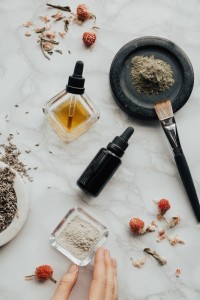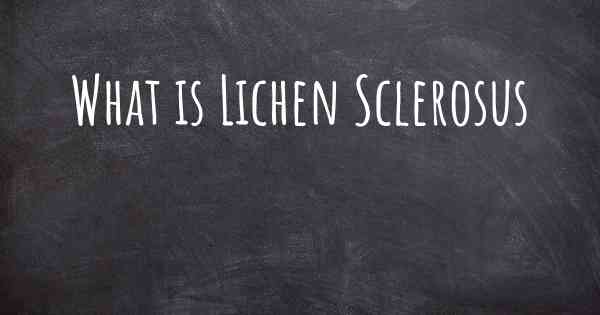Lichen Sclerosus is a difficult and distressing condition that can affect menopausal women. Many have not heard of it until they get a diagnosis. They are left wondering what is Lichen Sclerosus and what can they do about it. Find out more about Lichen Sclerosus and taking a natural health approach.
What is Lichen Sclerosus and What You Need to Know
What is Lichen Sclerosus?
Lichen Sclerosus is a condition that can affect both men and women of any age, but it is more commonly seen in women between the ages of 40 and 60. It usually affects the skin in the genital area, for women that could be on the vulva (the area around the vaginal opening) or around the anus.
Lichen Sclerosus Symptoms
There can be white patches, where the skin may be irritated, itchy, or wrinkly. It can be painful and sore generally, as well as when urinating or during sex. The skin can become thinner, and may be more likely to tear. Occasionally it can also affect the vaginal opening, making sex more painful or difficult. In men it can affect the penis and can also be painful.
 In this blog I am focusing on what is Lichen Sclerosus and sharing the experience of a patient I worked with. We will call her Lucy, and a little while ago she rang me in desperation…
In this blog I am focusing on what is Lichen Sclerosus and sharing the experience of a patient I worked with. We will call her Lucy, and a little while ago she rang me in desperation…
“I had been struggling with intense burning pains, and decided to see my GP. I was given some strong steroid cream to try. Two weeks later I went back because I was still in pain and the cream was not helping. At that point, my GP told me I had Lichen Sclerosus and that there was nothing they could do. I was so upset – the thought of always having this and the pain was awful. As well as the physical symptoms, it is a really personal condition. It doesn’t feel like something you want to talk about. And it affects how you feel as a woman. I spent a few days wondering what to do and then remembered Lynne.” Lucy, Sussex
This is an incredibly distressing condition, and both my patient and I decide to do everything we could to help.
What Drugs Are Used to Treat Lichen Sclerosus?
If you look online you will see that Lichen Sclerosus is considered incurable and that the main treatment offered is to alleviate the symptoms as far as is possible. Your GP will usually offer a strong topical steroid cream to temporarily soothe the skin in that area. Whilst it might provide some welcome initial relief, this has its limitations.
Steroid cream cannot be used continuously or indefinitely as the steroid cream can potentially thin the skin over time. Not helpful given the nature of the condition. And then when the cream is stopped, nothing has been done to address the cause of the issue so the symptoms are likely to return. Steroid cream may also contribute to yeast infections.
What is Lichen Sclerosus – is it an Auto-Immune Condition?
There is not a consensus about what causes Lichen Sclerosus. Current medical thinking classifies it as an auto-immune condition – the body attacking itself. I believe conditions are often described in this way when we are not yet sure what is causing the problem. It is a useful catch-all category for complex conditions. And it may well be the case that there is an auto-immune element for some women. But in classifying this way maybe we are missing something that could help in treating it.
What is Lichen Sclerosus Caused By?
 As this condition occurs significantly more often in women, and in their menopausal years, it seems reasonable to consider a hormonal element. This may be relevant in a number of ways. Changing hormone levels may be involved in activating or exacerbating an auto-immune response. Or the different balance of hormones themselves may be significant. Either way, I believe that working with the hormonal element is key in considering what is lichen sclerosus and how to help.
As this condition occurs significantly more often in women, and in their menopausal years, it seems reasonable to consider a hormonal element. This may be relevant in a number of ways. Changing hormone levels may be involved in activating or exacerbating an auto-immune response. Or the different balance of hormones themselves may be significant. Either way, I believe that working with the hormonal element is key in considering what is lichen sclerosus and how to help.
Help for Lichen Sclerosus – A Natural Health Approach
Often people imagine that menopause is all about “having no oestrogen”. If you have read some of my other blogs you will know that is not true, and that one of the keys to menopausal health is about creating a healthy hormonal balance. I don’t believe just reaching for HRT is an answer because it does not create balance, it simply adds in another layer. It could also be that additional oestrogen may be unhelpful. My approach is to support our system to find its own equilibrium.
With this in mind we created a tailor made plan.
- Support with Homeopathy – we used a constitutional homeopathic remedy to support my patient overall, as an individually tailored tonic. Adding in daily support remedies that more closely matched the specific Lichen Sclerosus symptoms as she was experiencing them. These were chosen and tailored to suit Lucy. If 10 women came with Lichen Sclerosus, they may each receive a selection of different remedies to support them in how they were experiencing this condition.

- Herbal Support – the first herb we used was Milk Thistle. We did this for three weeks to help the support the liver generally and its contribution to hormonal balance. After this we used Agnus Castus as it is often used to help balance women’s hormonal levels. Alongside this we added in Red Clover as this offers a wonderful source of phytoestrogens, helping as our own levels change. However, these herbs may not suit every woman with Lichen Sclerosus, and should not be used routinely. Different herbs support different aspects of hormonal balancing and need to be tailored to the individual. As we can see how Lucy progresses we will adjust the herbs we use accordingly. We specifically selected these herbs from a good quality supplier and in liquid tincture forms so that they were well as well absorbed as possible. As a very important note, it is crucial that before taking herbs or nutritional supplements you check with a healthcare practitioner if you have any health conditions or are taking any pharmaceutical medications from your doctor or over-the-counter, as they can potentially interact. If in doubt, do seek advice.
- Nutritional Supplements – we also used a good quality mutli-vitamin and mineral supplement, and an essential fatty acid combination.
- Dietary Changes for Hormonal Health – we looked at any ways in which my patient could improve her diet and to drink more water.
- Topical Treatment – given how sensitive this area of our body is, and how tender or itchy it might be feeling, I suggest using a good quality oil, cream or ointment for topical support. Calendula Oil can be helpful in helping skin to heal but if the skin is thickening maybe opt for a soothing cream like Stellaria Cream instead. I would not recommend using Petroleum Jelly products, whilst they might lock in moisture, they can also be irritant.
- Lifestyle – this area is often overlooked but can be so valuable. Are there any updates to how we are living that can be of help? Alongside diet, is there a benefit to adding in more exercise, relaxation or creativity. It will be a unique package for us all.
What Happened Using a Natural Approach for Lichen Sclerosus?
I really admire the way Lucy applied herself to this. She did everything in the plan and I will let her tell you what happened…
“I saw Lynne and we decided to take a hormonal approach to helping my Lichen Sclerosus. After about two to three weeks following this approach it was feeling better and I could notice a real difference. Four weeks on from starting this regimen, I saw the same practice nurse that had examined me when I had been to my GP’s before. I think she was pretty surprised as she said “it’s gone!”; she couldn’t see visible evidence of the Lichen Sclerosus. I felt elated and so relieved. I realise it’s a work in progress but was just so glad to have turned a corner.” Lucy
Can Lichen Sclerosus Cause Cancer?
For most women this should not be an issue. But for a few having Lichen Sclerosus may slightly increase their risk of vulval cancer. It is a good idea to check regularly and see your GP if you have any concerns.
Is Lichen Sclerosus a Sexually Transmitted Disease?
Lichen Sclerosus is not contagious and not a sexually transmitted disease. It may cause pain and discomfort, and as with any symptoms you are not sure about, it is a good idea to see your GP or practice nurse to get checked.
 Will Lichen Sclerosus Go Away on its Own?
Will Lichen Sclerosus Go Away on its Own?
If there are Lichen Sclerosus patches on the other parts of the body, they may clear in time. Without treatment, the patches in the genital area do not usually go away. So finding the treatment that suits you and works best for you over time is important.
What is Lichen Sclerosus – the Last Word!
I will leave you with Lucy’s words, and my sincere thanks to her for allowing me to share her story. When we talked about it she was adamant that she wanted to let other women know that there may be ways to help them if they are struggling with this difficult and distressing condition.
“It is about five months since we started taking this approach to my Lichen Sclerosus. I have had spells when I am completely unaware of it, and am pain free. There has been the odd blip, but we have managed it with the remedies. I have also seen that my whole health affects this, so paying attention to that has been important too.
I had felt so desperate about always having this and having been told there was nothing that could be done. I am so relieved that there has been an alternative route to try. And now feel positive about the future, knowing there are things I can do that make such a difference for me.” Lucy
I hope you have found this post What is Lichen Sclerosus to be of interest. I practice from clinics in West and East Sussex, and also via Skype. If you would like to discuss whether my approach might suit you, I offer a free mini-appointment so please do contact me.

